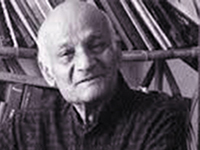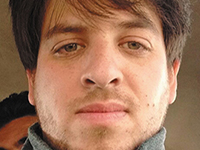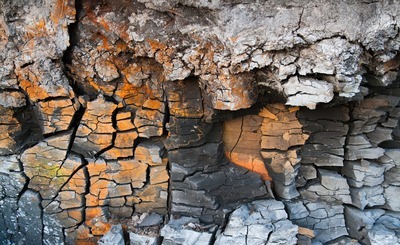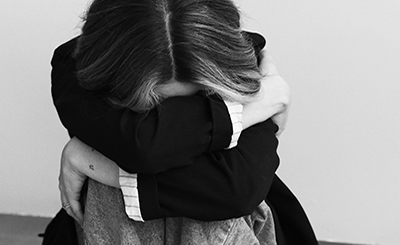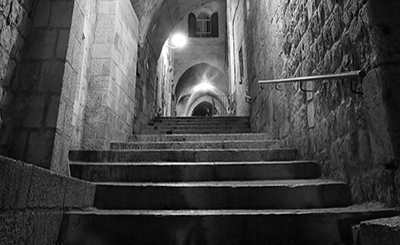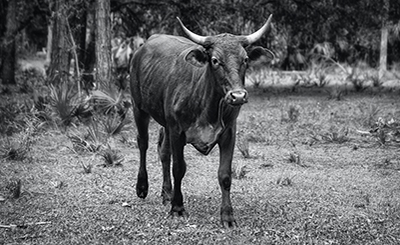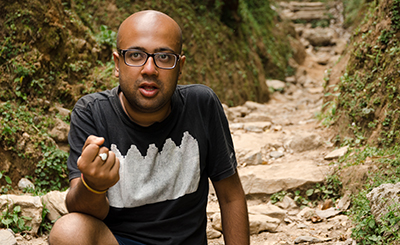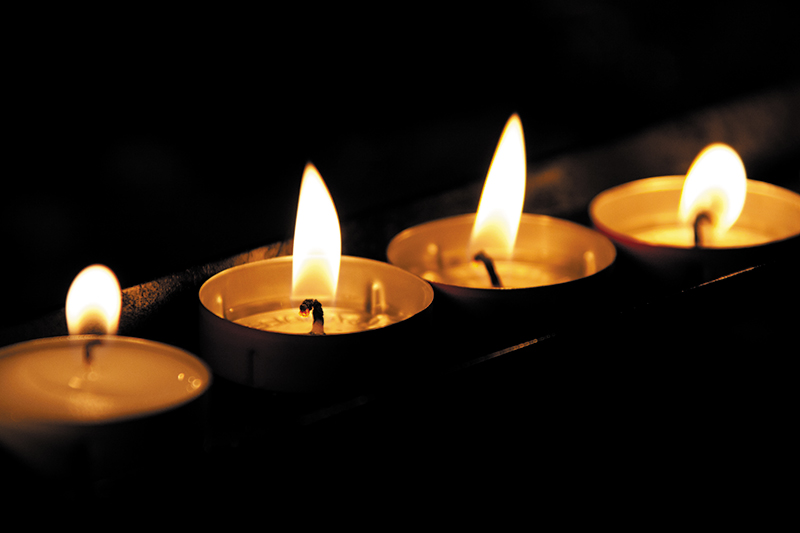
For Maryam, the vast wide world of God was just three places at once: Mecca, Medina and Ganj Basoda. But this business of numbers is yours and mine; we rote learn the numbers and so know the difference between two and three, you and me. But Maryam was innocent of such crimes of memory: she knew Mecca and Medina as Mecca — Medina: one place, her Hujoor’s place — her Hujoor lived and died there. Ganj Basoda existed only because Mandhu lived there — her younger son and the apple of her wrinkled eyes. The boy had a large boil on his cheek that was later removed by doctors; the doctor’s scalpel left a little window like hole in his cheek. His tongue would flutter in and out of the cheek-window much like the wooden bird on the alarm clock that announces the beginning of an hour. Ah! I remember now! Alarms! These are now relics of long gone history; how forgetful of me! His tongue would flutter out from the hole, like a nice big fish taken out of water.
I well remember how I laughed — khe khe khe khe, till my sides ached and eyes filled with big boy tears, when Maryam first recited this anecdote to Amma. If Maryam hadn’t nestled me with those large coarse hands and hid me in her lap quickly, Amma would have beaten me black and blue. “Aye Rid-ul-Ain, stop! Stop! He is just a child, just a child, Rid-ul-Ain.” N0netheless Amma hit out in her anger at me twice or thrice. And poor Maryam took those blows on her coarse hands. Picking me up, she quickly sneaked away to her quarters. Wiping away my tears and her tears, she wept out aloud: “Aye Rid-ul-Ain, Don’t you know Allah’s gifts are children, the ummah of the Prophet include children. If you beat them, curse them, do you expect forgiveness from Allah and his Rasul? Perform tauba, Rid-ul-Ain, seek forgiveness, Rid-ul-Ain.” After all the crying was done and advice given, she entertained me with several versions of the anecdote that was the original cause of my affliction: “So son, what did the daangars do? The bastards carved out a large window in his cheek. And how does his tongue flutter out from it? thirak thirak thirak…”
Maryam had been bestowed with a generous heart. And come to think of it, why should it not have been so? It housed the city of her hujoor, and a thousand Basodas fenced with maternal love for the myriads of Mandhus, who’d knock on the doors of tender motherly love beseeching: “Anna Bua open the door, Allah’s gifts are here, Nabi’s ummah is here.” Maryam had suckled my father and nursed me as well. She was the ubiquitous Anna bua for all my nephews and nieces. One fine day, I stole some chocolates from a large glass jar that she kept hidden on a shelf of her room. Maryam was a habitual offender, guilty of spoiling and indulging children with unbridled love. But she could never dare to consent to a heinous act like theft. She promptly reported the matter to Amma, but Amma with her imposing tall frame, the daughter of a jagirdar with his fiery Pathan blood flowing through her veins, could never imagine her son indulging in a petty crime as theft. She was quite offended by this ‘insult’, and lashed out venom at Maryam. Abba oblivious of this incident, kept to his daily routine: after Isha namaz he’d come and inquire of Maryam’s well-being while sitting beside her, and trying to press her legs. After ten, twenty minutes of small talk, having received his fill of blessings, he’d retire to his room to sleep.
The stalemate continued for three four days; both the centres of my paradise were furious at each other, tormenting me no end. Though, Amma did not let any dereliction occur in her duties towards Maryam, yet no sooner would she stumble upon her than her delicate features would assume a stern and stony expression. In the end, after four or five days, exhausted from this attrition, and unmindful of the beating I was likely to receive, I put my head down in Amma’s lap and confessed to my crime. The ground shook beneath her feet. She glared at me with sheer disgust, pushed me aside; stood up and ran with lightning speed to Maryam’s quarters: “Anna Bua, your ‘manjhla’ turned out to be a thief, Bua forgive me! Forgive me, please!” I gathered some courage, peeping in through the half open door, taking particular care that the wall of the corridor should shade me. I could see Maryam, hands trembling, overwhelmed with emotion trying to kiss Amma’s hands, laughing between her tears and pretending to slap Amma: “Quiet Rid-ul-Ain”, I said: “ quiet. Quiet Rid-ul-Ain or you will have the worst of me.”
The innocent simple minded woman that Maryam was, she remained cross with my aunt to her last breath, simply because my aunt had been named Fatima. Rid-ul-Ain there was only one Bibi Fatima, the princess daughter of the beloved Prophet. How can we, the dwellers of hell, emulate her? Tauba Tauba, Istighfaar!
During the night that falls between ninth and tenth Muharram, she would enjoying eating, cooking and serving delicious papad and pakodas to all and sundry. She would participate in all ta’ziyah and processions with unfailing khushu and khuzu. On the morning of tenth, she would sit with great grave dignity after performing ablution and get us, children, to recite shahadat-nama to her all day. Allah forgive her noble soul, she’d take great liberties with kalima-shareef, reciting it the way her fancy dictated: “La Illaha illala nabi ji rasul-ul-Allah, La Illaha hujoor ji rasul-ul-Allah.” Chanting the name of Hussein, she would cry her eyes out and when the grief overcame her, she’d switch to obscenities soon: “O! The bastards murdered my prince! O! The wretches martyred my king! During Muharram her most favourite act was to turn us into faqirs of Hassan and Hussein. She would dye our kurtas green and tie with safety pins small sewed pockets with an anna each in them.
Allah forgive his sins and bless his grave; my grandfather was somewhat of a Wahhabi and so Abba, also, is influenced by him. But Maryam wasn’t one to care about anyone’s wahabiyat; for the ten days of Muharram, she reigned supreme as the sole dictator. But this dictatorship was also founded on the principle of live and let live. After decking us in green kurtas and applying kohl to our eyes, she would quietly instruct us: “Look child! Stay out of Baday miyaa ji’s path, ok?” And baday miya, my grandfather of blessed memory, would act as if he were displeased by this tomfoolery. Yet, one year when Maryam went to Basoda during Muharram, no-one recited shahadat-nama that year, nor was Hussein mourned in our house; neither we became faqirs that year, nor was Ashura observed. Rather, on Ashura, we spent the whole day playing cricket. In the evening when Grandpa came home after namaz, and caught us red-handed creating a ruckus in the courtyard, he picked up a thick stick and brandishing it, bellowed out: “You scoundrels, faqeeers of Hassan and Hussein, the crone is gone today and so you create a ruckus to your heart’s content? Can’t you behave like normal human beings and read Yasin Shareef quietly?” Read Yasin Shareef in the memory of Hasan Hussein, in the blessed memory of baday miya ji, in the affectionate memory of Maryam and her son Mandhu; for all these beautiful names fuel the eternal flame of your fond memories.
But I never knew Mandhu at all. I just knew that Mandhu lived in Basoda and that doctors had carved out a window in his cheek, which opened up to the paradise that flourished in Maryam’s imagination. I also happened to know very well that when Maryam would sing aloud: “Khwaja piya, zara kholo kiwadiyan”, Amma’s koel like voice would blend in; and all the thousand doors of paradise would be thrown open to me. I would lie my head quietly in Amma’s lap and witness the Khwaja descending in the celestial musical light distributing blessings and joy all over the house. I hear, Amma still sings whenever she is in the mood; May Allah keep her happy and cheerful! But the voice of Maryam is silenced forever, or perhaps tired of the world, she now only sings lullabies to Mandhu in the graveyard at the outskirts of Basoda.
Maryam’s greatest desire was to travel to perform haj. Though Maryam was greatly revered and treated as one of the elders of the family, yet no one knew since when she was paid a salary. Abba says when he received his first salary in life as a school teacher, he put the same at her feet. Maryam swelled like a lotus with pride and joy; taking some money from her chador, she immediately pressed the servant-girl into service: Run along quickly to the market and get some jalebis for me. After the jalebis had been brought, she recited the kalma herself over them and marched with great pride to grandpa: “Baday mian ji, congratulations! Dulhay miya has received his salary.”
From then on, she fixed her salary at one rupee per month to be paid out of Abba’s salary. Maryam had practically little expenses, if any at all: she had inherited some land at basoda from her late husband that sufficed for Mandhu and owned a few goats, which were looked after by Mandhu. Her elder son — Shatab Khan was employed as a chowkidar in the Railways and did well for himself. For years, no one knew what use did Maryam put her salary to? Then one fine day, she came up to Abba with many rupee notes, crumpled and dirty and some coins. She declared that she desired to perform Haj. She had been saving a Mecca-Medina fund all these years from her salary to fund her fare to haj. Abba counted the money and it came to nine hundreds, three twenties, seven rupees and some annas. Maryam was least bothered by or interested in how much the money came to; her only interest lay in whether or not it would buy her a tickas to Mecca-medina. Abba conceded it would certainly buy her a return ticket to Haj and so Maryam started making preparations in full earnest.
Every moment, sitting or standing she would hum, “Khwaja piya…zara kholo kiwadiyan”, for the windows of Mecca-medina had opened up to her and the aroma of the Prophet’s holy dress wafted in through them. Someone tried to tease her: “Maryam! You don’t even know how to offer namaz properly, nor know any Quran by heart. How will you perform Haj then?” Maryam was offended beyond measure: “Why? Was I not born a girl to a Muslim? Was I not the spouse of a Muslim? Why then won’t I know how to offer Namaz properly? I know the kalmia-shareef and the four qul, what else do you want, huh? What else, huh?” And then a meadow of love for the Prophet had sprung up in her heart, what else would one need after that?
But one day a letter from Shatab Khan came as a bolt out of blue. Mandhu was seriously ill. The little money gathered from selling the goats had all been spent on medicine and the land had been mortgaged as well. Yet nothing seemed to work. If she wanted to see Mandhu alive for the last time, then the letter may be treated as a telegram. Suddenly Mecca-medina faded out from Maryam’s eyes in a thick mist of warm warm tears. She tied her nine hundreds, three twenties, seven rupees in her chador and sat in the bus to Basoda crying and weeping her eyes out.
Page
Donate Now
Comments
*Comments will be moderated
great story. Brilliant translation!
Irfan
Dec 9, 2016 at 17:14



